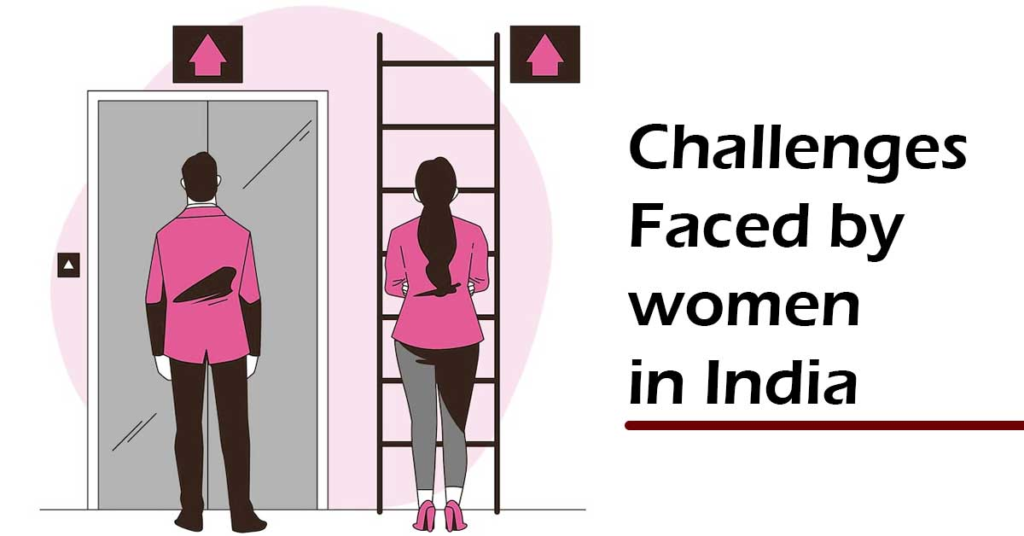Issues related to Women
Relevant for sociology optional Paper- 2 & GS Mains Paper- 2

Women have been subjected to various forms of discrimination, oppression, and violence throughout history. Although progress has been made in recent years towards gender equality, many issues related to women still exist, especially in developing countries like India. These issues can be broadly classified into social, economic, and political categories. In this essay, we will discuss some of the significant issues related to women in India and their implications.
Social Issues: One of the most significant social issues related to women in India is gender discrimination, which manifests in various forms. Gender discrimination occurs in different spheres of life, including education, healthcare, employment, and politics. In India, women’s education levels are lower than men’s, with the female literacy rate at 65.5% compared to the male literacy rate of 82.7%. Girls are often pulled out of school early to take care of household chores or because parents prioritize their sons’ education. This gender bias in education leads to lower employment opportunities, lower earnings, and lack of economic independence.
Gender-based violence is another severe social issue related to women in India. Violence against women includes physical, emotional, sexual, and psychological abuse. Domestic violence is prevalent in India, with over 31% of women experiencing physical violence by their partners. Acid attacks, dowry deaths, and honor killings are other forms of violence that women face in India. The legal system in India has been slow to respond to these issues, leading to low conviction rates and impunity for perpetrators.
Sexual harassment and assault are also significant issues related to women in India. The #MeToo movement brought attention to the widespread prevalence of sexual harassment and assault in India. Women in workplaces, educational institutions, and public spaces face sexual harassment and assault regularly. Victim blaming and shaming further discourage women from coming forward and seeking justice.
Economic Issues: Women in India face significant economic challenges, including unequal pay, lack of access to credit, and limited job opportunities. Women’s participation in the workforce in India is low, with only 23% of women employed compared to 76% of men. Women also earn significantly less than men, with women earning only 62.5% of men’s earnings.
Women’s lack of access to credit and financial services is another significant economic issue related to women in India. Women often lack collateral, which makes it difficult for them to access credit. Lack of financial literacy and gender bias among lenders also prevent women from accessing credit and financial services.
Political Issues: Women’s political participation and representation in India are relatively low. Women make up only 14% of the parliamentarians in India, despite comprising almost 50% of the population. Women’s participation in local government is slightly better, with 33% reservation for women in panchayats (local self-governance bodies). However, women in politics face significant barriers, including gender bias, sexual harassment, and discrimination.
Implications: The issues related to women in India have significant implications for women’s well-being, gender equality, and economic development. Discrimination against women in education, employment, and political participation leads to lower economic growth and human development. Violence against women, including sexual harassment and assault, leads to women’s physical and emotional trauma, undermining their social and economic well-being. The lack of women’s representation in political decision-making also leads to policies that do not address women’s issues and concerns.
Conclusion: In conclusion, issues related to women in India are significant challenges that require immediate attention and action. Achieving gender equality and empowering women is not only a human rights issue but also an economic imperative. Addressing these issues requires multi-dimensional efforts from governments, civil society, and international organizations. It is essential to promote women’s education, health, and economic empowerment, eliminate gender-based violence, and increase women’s political participation and representation. Providing equal opportunities to women and ensuring their rights are respected and protected is crucial for achieving a just and equitable society. It is imperative that we work towards creating a world where women can live without fear of discrimination, violence, or oppression. This requires a collective effort from everyone in society, men and women alike, to recognize and challenge the systemic barriers that perpetuate gender inequality. Only then can we hope to create a world where every woman is able to reach her full potential and contribute to the betterment of society as a whole.
For more such free UPSC notes, Articles, News & Views Join our Telegram Channel. https://t.me/triumphias
Click the link below to see the details about the UPSC – Civils courses offered by Triumph IAS. https://triumphias.com/pages-all-courses.php


